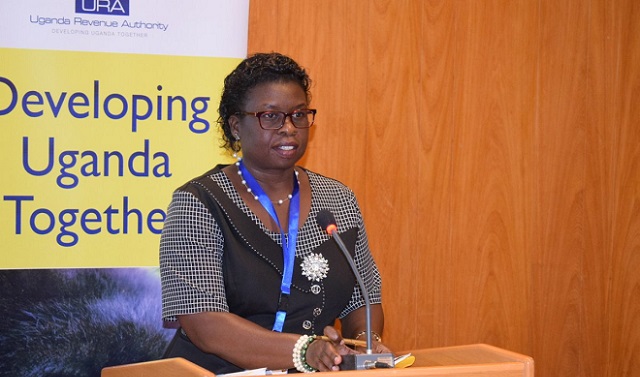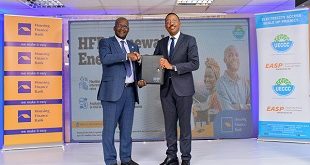
Experts want more from her new term as URA boss
Kampala, Uganda | JULIUS BUSINGE | Doris Akol, the Commissioner General for Uganda Revenue Authority (URA) must be a happy woman at the moment. While on a six months maternity leave that ends in February next year, she recently got the news that her contract had been renewed for another four years up to 2022.
Commissioner General is one of the most powerful positions in the country. Sources familiar with this development told The Independent that her bosses, President YoweriMuseveni and Finance Minister, Matia Kasaija, were impressed by her performance recorded from FY2014/2015 up to FY2017/2018 during which, revenue collections have grown year-on-year.
However, she has failed to hit or surpass annual targets. A detailed document shared by URA officials to The Independent showing performance for the last four years indicates, total gross revenue collection has exceeded Shs48.7trillion which is an average of over Shs12 trillion per annum or Shs1trillion per month.
There has been visible growth in revenue from Shs9.7trillion in FY2014/15 to Shs14.5trillion in FY2017/18 indicating an absolute growth of Shs4.8trillion.
Tax to GDP ratio has improved from 12.33% to 14.33% by the end of FY 2017/18. Additionally, the tax to national budget ratio has improved from 69.04% to 73.9% in FY2016/17 and 71.5% in 2017/18.
The total number of registered taxpayers has increased by 108.8% from 632,379 to 1,320,691 in the period under review. Officials say this performance was boosted by various initiatives over time including the Tax Registration Expansion Program (TREP), robust tax education and sensitisation campaigns and block management (physical identification and mapping of taxpayers.)
In the East African region, the URA revenue growth has been the highest recorded at 15.1% ahead of Tanzania Revenue Authority at 13.1%, Kenya Revenue Authority at 10.8%, Burundi Revenue (OBR) at 8.4% and Rwanda Revenue Authority at 12.8%.
Supporting factors Officials say while the informal sector is estimated to cover up to 49% of the economy, under TREP, URA has for the last four years collaborated with other government agencies; Kampala Capital City Authority (KCCA) and the Uganda Registration Services Bureau (URSB) to formalise businesses.
URA has deployed staff at One Stop Shops (OSS) in over 34 municipalities to ensure that taxpayers register their business name, acquire trade licenses and register for taxes under the same roof.
The other is taxpayer education and compliance where several activities like countrywide budget breakfast meetings, tax katales, familiarisation visits to the top taxpayers, university debates and establishment of tax societies in all the major universities.
There has also been revitalisation of rental income taxation that saw the development of the proposed rental tax policy in FY 2018/19. There has also been launch and implementation of the receipt utilisation initiative aimed at boosting book keeping amongst small businesses.
This campaign also intends to nurture a culture of issuing and demanding for receipts amongst the citizens whenever purchases or sales are made.
The other reforms are; operationalisation of the one stop border posts, regional electronic cargo tracking system, the centralised document processing centre, the Uganda electronic single window, the electronic issuance of certificates of origin, authorized economic operator, implementation of single customs territory and rolling out camera and surveillance system.
The other achievements recorded during the period are the launch of a Tax Agent Registration Committee (TARC) to regulate the operations of tax agents and the launch of construction of the Shs139bn URA building which is about to be completed.
However, amidst increased revenue collections, there have been challenges including non-compliance by some taxpayers, smuggling of goods at borders, a volatile economic environment, and tax avoidance by some taxpayers and failure by some people to understand a number of taxes which has resulted into resentment.
These challenges are partly to blame for the persistent revenue shortfalls recorded annually during Akol’s four year term. For instance, in FY2014/2015, the shortfall was Shs139bn, in FY2015/2016 it was Shs404bn, in 2016/2017 it was Shs458bn and last FY 2017/2018 it was Shs600bn.
Expert views Frederick Kibbedi (CPA), a partner at PKF, an accounting and business advisory firm told The Independent that Akol’s performance has been good but, going forward, her new term should focus on improving performance of the electronic register and the incidence of transactions.
“If the creation of invoicing registers is accelerated and widely implemented then more taxpayers will get on the register,” Kibbedi said. He also said that tax formulation and administration needs to be more consultative and forward looking while maintaining the development agenda to avoid taxpayers resisting new taxes like one on mobile money.
 The Independent Uganda: You get the Truth we Pay the Price
The Independent Uganda: You get the Truth we Pay the Price


